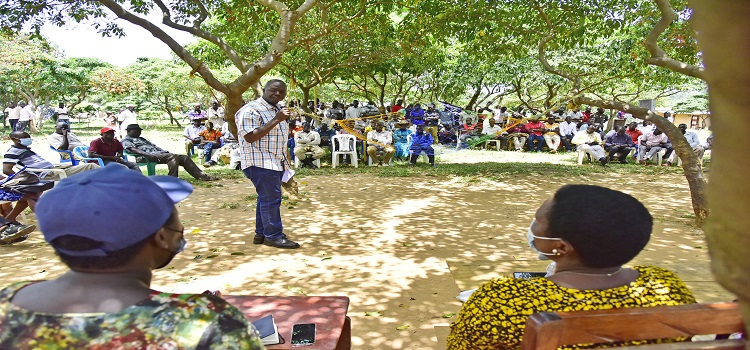The Parliamentary Committee on Agriculture, Animal Industry and Fisheries that is scrutinizing the Fisheries and Aquaculture Bill, 2021 has held consultative meetings with stakeholders in Buvuma Islands, Katosi Landing site in Mukono and Kiyindi Landing sites in Buikwe district.
The bill is a revision of the Fish Act of 2000 Cap. 197, which emanates from the 1951 Fisheries Ordinances which only regulates captured fish and does not address aquaculture activities such as management of commercial fishing, fish selling, post-harvest handling, fish transportation and surveillance.
The Chairperson of the committee, Hon Janet Okori Moe said that it is important to consult all the concerned parties in the fisheries sector as the law will have an effect on all of them.
“This is a law we cannot rush. The fish sub-sector has attracted the biggest number of petitions in the House; this is your moment to also tell us your views,” she said.
The committee consultations are intended to generate views from fishing communities who are the end users of the law.
The councilor for Nakisoga sub-county, Robert Ssentongo Mwesigwa said that involving the locals in the law making process grants them ownership of the laws.
“Don’t legislate for Parliament, make laws to help the local people,” said Mwesigwa.
At Katosi, Abdul Karim who deals in silver fish (mukene) said that fines of up to Shs200 million as proposed in the bill are too high which he adds will force them to abandon the lakes and some may turn to criminal activities.
A lady in Buvuma makes her contribution during the meeting
The Mayor of Katosi Town Council, Ismail Kibalama proposed that the new law should be translated into local languages for the people to read and understand it.
In the fishing community in Buvuma opposed clauses in the bill on obtaining permits which they referred to as double taxation.
The bill proposes fishing, storage, fish movement and dealing in fish product permits.
They also called for removal of the army from the lakes and asked that fisheries officers are facilitated to do their work.
The bill in part prohibits fishing without a licence where a person will not engage in any fisheries or aquaculture activities without the relevant licence.
The bill also stipulates a penalty for the owner and crew of a vessel or vehicle which transports fish without a valid transport licence. The offender is liable on conviction to a fine not exceeding shs100 million or imprisonment not exceeding three years or both.
Article 46 provides for a fish movement permit. It states that, ‘a person shall not for purposes of trade, move fish or fish products from one place to another, unless in possession of a valid movement permit’
The fine for the offence is Shs40 million.
The Bill is part of efforts by the Ministry of Agriculture to provide an enabling policy and regulation framework to the stakeholders engaged in fisheries and aquaculture activities. The fisheries and aquaculture sub-sectors contribute significantly to Uganda’s national economic growth, development as well as food and nutrition.
Do you have a story in your community or an opinion to share with us: Email us at editorial@watchdoguganda.com













